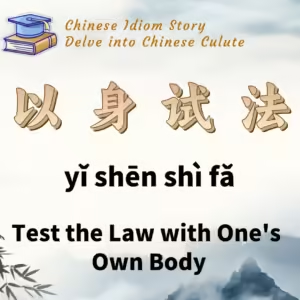
Chinese Idiom: 克己奉公 (Ke Ji Feng Gong)
English Translation: Self-restraint for the public good
pīn yīn: kè jǐ fèng gōng
Idiom Meaning: This idiom refers to the practice of strict self-discipline and prioritizing public interests over personal desires.
Historical Source: Book of the Later Han (《后汉书·祭遵传》).
Idiom Story:
Ji Zun (祭遵), known by his courtesy name Disun (弟孙), was a figure from the Han dynasty, hailing from the Yingchuan region (present-day Xuchang, Henan). In his early years, he served Liu Xiu, participating in military campaigns in the Hebei area, where he was responsible for enforcing laws within the military camps. He was known for his strict enforcement of the law and refusal to show favoritism.
One day, one of Liu Xiu’s attendants committed an offense. Ji Zun not only apprehended him but also followed the law and executed him for his crime. This action displeased Liu Xiu, who wanted to punish Ji Zun for his harshness. However, someone advised Liu Xiu, saying, “Your Majesty, you have always emphasized the importance of strict obedience to orders in the army. Ji Zun’s unwavering commitment to the law and his refusal to indulge personal feelings is commendable. Only with such discipline can you establish authority in the military.”
Liu Xiu then pardoned Ji Zun and promoted him to the position of “General of Eliminating Treachery.” In the second year of the Jianwu era (26 AD), Ji Zun was further promoted to General of Subduing the Lurking Enemy and was granted the title of Marquis of Yingyang.
The historian Fan Ye, who compiled the Book of the Later Han, praised Ji Zun, stating, “Zun was a person of integrity and caution, practicing self-restraint for the public good.” This highlights Ji Zun’s commitment to self-discipline and his focus on public duty over personal interests.
From this story, the phrase “克己奉公” emerged, embodying the virtues of self-restraint and dedication to serving the public. Today, it serves as a moral guideline, encouraging individuals to prioritize the collective good over personal gain.






